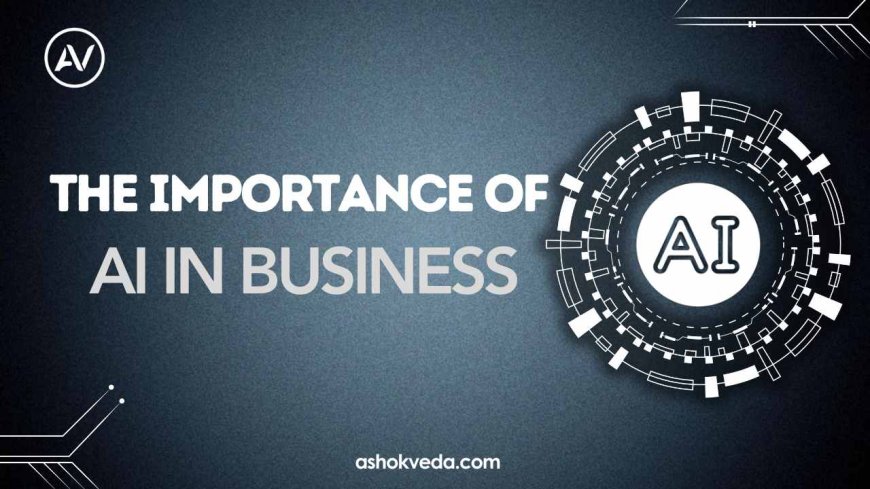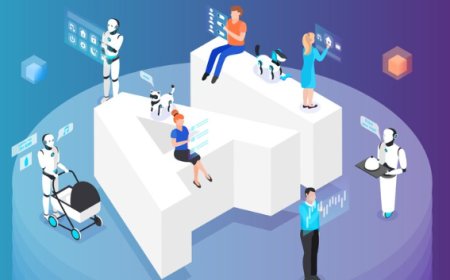The Importance of AI in Business
Learn how AI enhances business efficiency, decision-making, and innovation through practical applications and strategic insights.

Hey, there! Have you ever thought how businesses can keep up with the exciting world we live in? Under what goes on, there are a lot of interesting things going on, from personalized shopping recommendations to effective customer service and the importance of AI in business. The value of AI in business, from expanding customer service to optimizing processes, cannot be stressed. We'll look at how organizations of all sizes are using AI to stay ahead of the competition and why it's becoming an important tool in the current world.
The importance of artificial intelligence in business must be noted. It helps businesses of all sizes become more efficient, creative, and better at maintaining their consumers. Whether you're running a small business or a major corporation, AI can make a real difference. So, let's look at how this technology is changing the corporate scene and why it is so important for the future.
Understanding the Role of AI in Business
Before we go into the details, let's explain about. AI, or Artificial Intelligence, is the skill of machines to imitate human intelligence. This involves experience-based learning, understanding of natural language, pattern recognition, and decision-making. AI may help businesses automate operations, generate data insights, and improve customer experiences, among other things.
One of the major advantages of AI is its capacity to process huge quantities of data at high speeds. This allows companies to get information and find trends that would be impossible to identify manually. It's like having a super-intelligent assistant who can filter through mountains of data and highlight what's important.
I. Customer Experience Revolution.
Artificial intelligence is changing how organizations communicate with their clients. This section will look at how AI improves customer experiences by offering personalized and efficient service.
-
Personalized Interactions: AI systems analyze customer information to provide specific advice and experiences, making them feel appreciated and understood.
-
Chatbots and Virtual Assistants: These options offer instant customer help, resolving inquiries and concerns swiftly and efficiently.
-
Predictive Analytics: AI predicts client wants and behaviors, allowing businesses to anticipate and meet demand in advance.
II. Operational Efficiency and Automation.
AI is optimizing company operations, increasing efficiency and cost-effectiveness. This section will discuss how AI optimizes various business operations.
-
Automation of Routine Tasks: Artificial intelligence automates repetitive jobs, allowing staff to focus on more strategic activities.
-
Supply Chain Optimization: Artificial intelligence enhances supply chain management by predicting demand, managing inventories, and optimizing logistics.
-
Process Improvement: AI examines corporate processes to find inefficiencies and recommend improvements.
III. Data-Driven Decision Making.
One of the most important advantages of AI in business is its capacity to improve decision-making. This section will look at how artificial intelligence can help organizations make more informed, data-driven decisions.
-
Advanced Analytics: AI analyzes massive volumes of data to generate insights that guide company strategy and decisions.
-
Market Analysis: Artificial intelligence assists firms in understanding market trends and consumer behavior, allowing them to build more successful marketing plans.
-
Risk Management: Artificial intelligence examines risks and makes recommendations to manage them, assisting organizations in avoiding possible dangers.
IV: Innovation and Product Development
Artificial intelligence is driving innovation in product development and services. This section will look at how companies use AI to develop new goods and improve old ones.
-
Research and Development: AI accelerates R&D by analyzing data and identifying new opportunities for innovation.
-
Product Customization: Artificial intelligence enables businesses to provide customized products and services that are tailored to the needs of each unique customer.
-
Improving Existing Products: AI helps in the improvement of products by offering insights into performance and potential improvements.
V. Human Resources and Talent Management
AI is changing HR and personnel management, making them more efficient and effective. This section will look at how AI is transforming HR practices.
-
Recruitment and Hiring: AI makes recruitment easier by evaluating resumes and selecting the best applicants.
-
Employee Development: AI offers individualized training and development programs to help people grow and develop.
-
Performance Management: Artificial intelligence tracks employee performance and delivers insights to boost productivity and engagement.
VI. Security & Compliance
AI plays an important part in maintaining corporate security and compliance. This section will go over how artificial intelligence (AI) helps organizations protect themselves from risks and assure compliance with regulations.
-
Threat Detection: AI scans systems for security threats and responds to them in real time.
-
Data Protection: Artificial intelligence aids in the security of sensitive data by detecting flaws and executing preventive measures.
-
Regulatory Compliance: AI automates compliance checks and audits to ensure organizations follow regulations.
VII. Case Research and Practical Examples
To show the importance of AI in business, this section will include practical examples and case studies of companies that have effectively used AI.
-
Amazon: Amazon uses AI to power its recommendation engine, which drives an important portion of its sales. By analyzing customer behavior, Amazon can suggest products that are highly relevant to individual users, boosting both customer satisfaction and sales.
-
Netflix: Netflix’s recommendation system is another excellent example. AI analyzes viewing habits to suggest movies and TV shows that users are likely to enjoy. This personalization keeps subscribers engaged and reduces turnover rate.
-
Tesla: Tesla uses AI to improve its self-driving technology. The company collects data from millions of miles driven by its cars, using this information to improve the accuracy and safety of its autonomous driving features.
-
Spotify: Spotify uses AI to curate personalized playlists for its users. By analyzing listening habits, Spotify can recommend songs and artists that match individual preferences, creating a more engaging user experience.
Challenges and Considerations
While the importance of AI in business is clear, it’s not without its challenges.One big issue is data privacy. Businesses have to make sure that they manage client data properly and in accordance with rules. Transparency is essential—customers must understand how their data is used and maintain control over it.
Another difficulty is the shortage of skilled workers. Data science, Machine Learning, and other technical skills are required while developing and implementing AI solutions. Companies must invest in training and development to create a workforce that can effectively use AI.
The Future of AI in Business
Going in advance, the importance of AI in business will only increase. As technology improves, we may expect AI to become increasingly incorporated into everyday activities. From predictive analytics to enhanced automation, the options are limitless.
One interesting area of growth is the integration of AI with other emerging technologies. For example, merging AI and the Internet of Things (IoT) can result in smart systems that can monitor and optimize processes in real time. In logistics, this might entail better routing and inventory management, lowering costs and increasing efficiency.
The importance of AI in business is known. AI has many advantages for businesses, including transforming consumer experiences, leading to innovation, and assuring security. Businesses that adopt AI may remain competitive, increase efficiency, and give better products and services to their customers. As AI advances, its importance in business will only grow, making it an indispensable tool for success. So, let us embrace the power of AI and realize its full potential to propel our enterprises ahead.





































